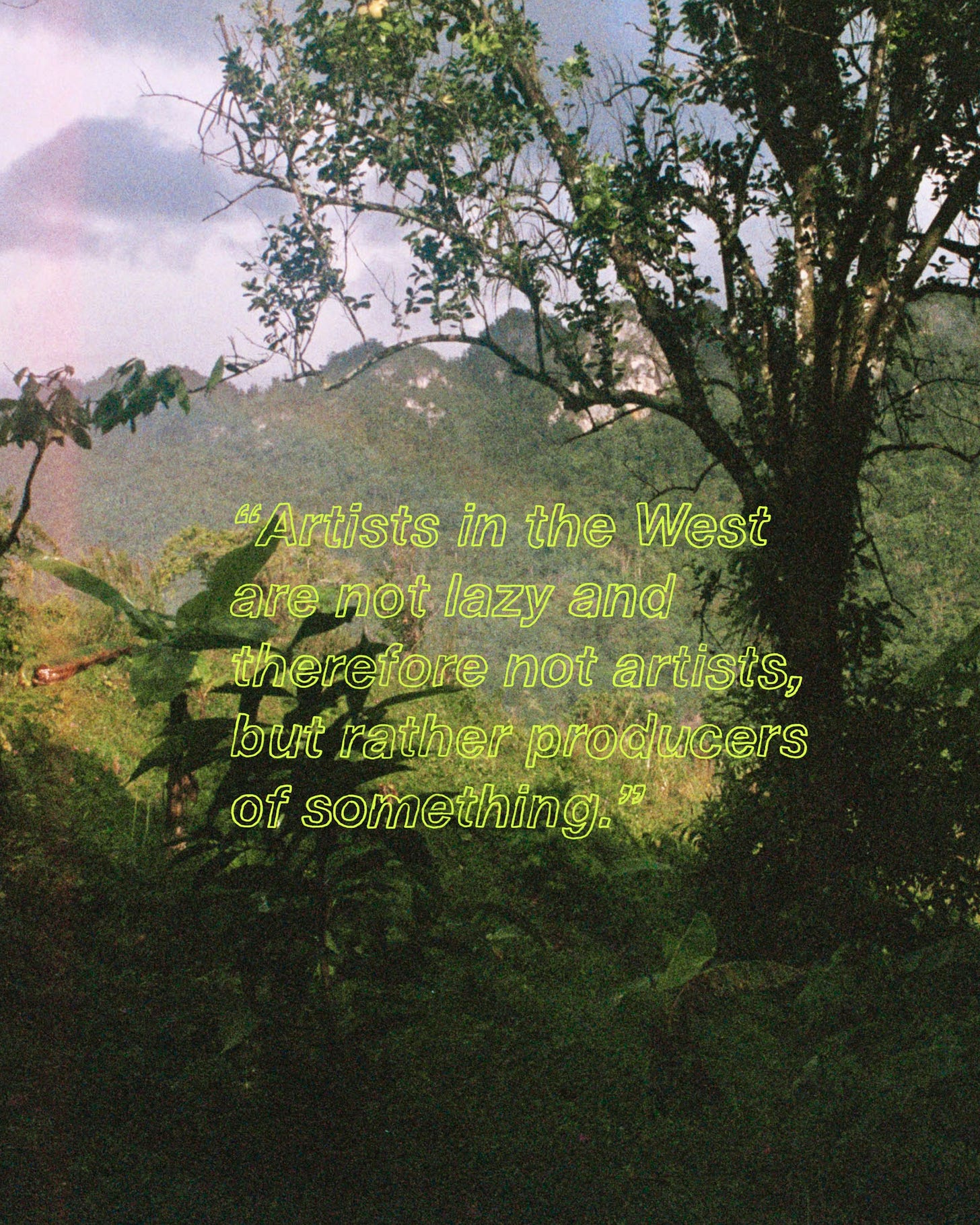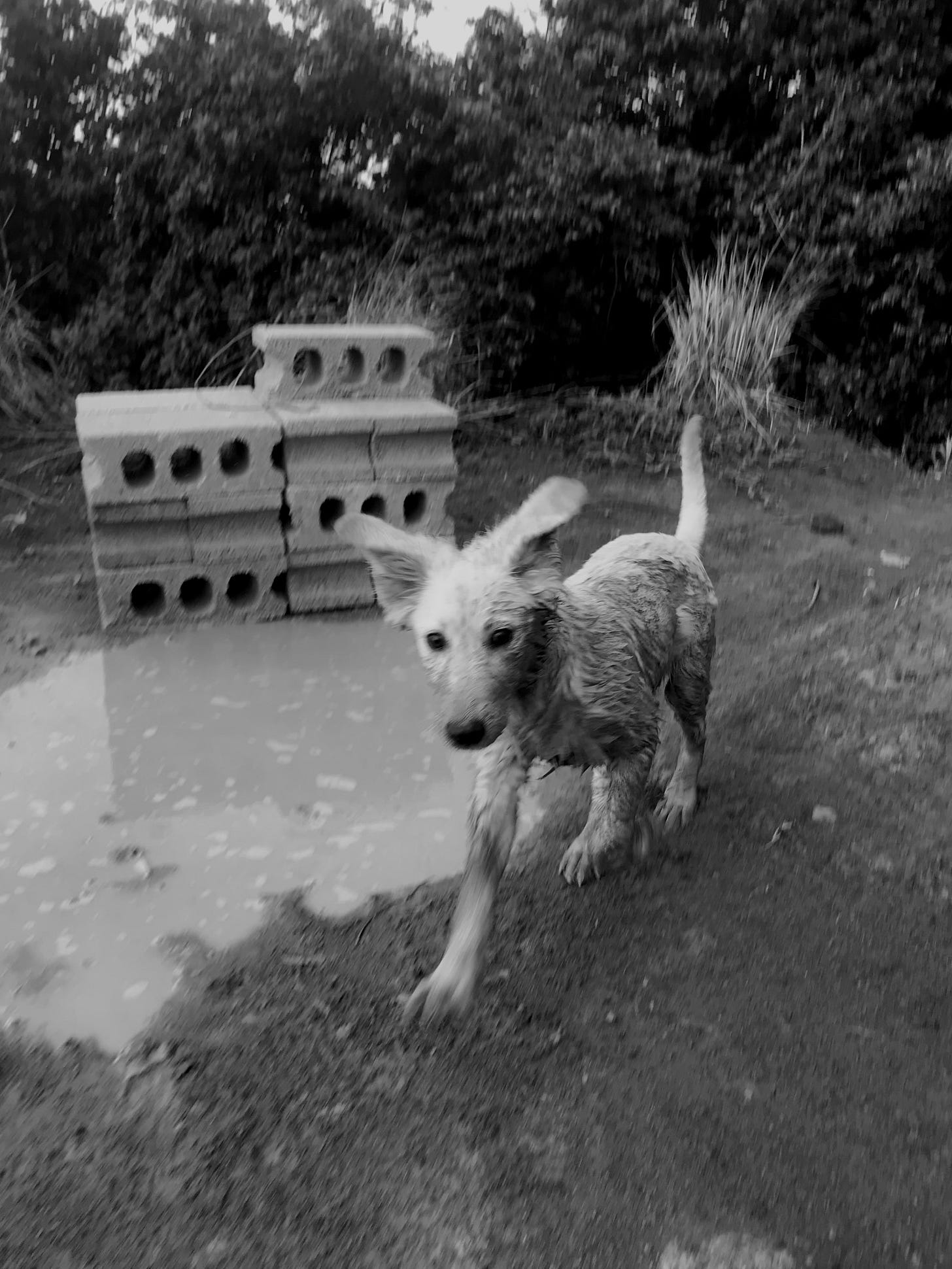We talk a lot about going slow. Mostly because it’s difficult to slow down. Our minds, our routines, our worlds. When it’s easy (read rewarded in capitalism) to want to be very productive. But productivity isn’t the opposite of slowing down. Slowing down is productive. Ok, hear us out.

“Artists in the West are not lazy and therefore not artists, but rather producers of something. Their involvement with matters of no importance, such as production, promotion, the gallery system, the museum system, the competition system (who is first), their preoccupation with objects—all that drives them away from laziness, from art. Just as money is but paper, a gallery is but a room.”
Excerpt from In Praise of Laziness, by Mladen Stilinovic (link to entire poem)
Gabo’s mom is on the phone; we’re driving toward her place in Isabela and we are calling again to give an updated ETA. We’re very late. But before we can apologize again for our lateness, she interrupts, “I live at the beach, don’t bring your continental energy here.” We’ll get there when we get there.
We didn’t start our newsletter until beginning our second year on the farm. Because it felt like nothing was happening. Small progress like a functioning grey-water system or finding the most mold-resistant tent felt really trivial. Obviously necessary, but not necessarily worth emailing everybody about. Going forward we are aiming for monthly updates, but will spare you the news that the grass is still, in fact, growing.
Introductions: Colibrí (hummingbird en español)
The last week of March we were driving back to the farm when we spotted a dog in the trash. Someone had abandoned a puppy near the old basketball court in our little community. Terribly thin, its fur was covered in stickers and we picked them out as we drove to the vet. We lost our beloved dog Kahlo in December when her heart gave out. We knew it was a risk with all of the surgeries that had prolonged her life, but it was still very sudden and unexpected. We’ve felt somewhat lost without her. Though, we hadn’t intended to get another dog this soon, the universe had other plans.
At the vet we learned he’s (probably) a golden retriever, and based on his teeth around 2 or 3 months old. We are calling him Colibrí because of the zoom in his energy. Little dude has definitely broken down all previous routines, chewed them up (literally and figuratively) and in the process, made us a new, better routine.
We’d been trying for A WHILE to get into a farm schedule that functioned with both flexibility (to grow as we will) and support (for the health/sanity of ourselves and the land). For months before we lived at the farm, the two-hour commute (one way) destroyed our motivation to rinse-and-repeat the long days. Moving to the farm full-time created its own set of motivation destroyers.
(More about our journey in getting started. Read Steven’s writing about our first two years, trying to start the farm and find our footing: Start Here, Context is Everything)
Now we start nearly everyday at sunrise, and after a walk, Coli watches the cars in the valley for a bit. If we humans have our shit together we get to enjoy a coffee at the same time. Coli needs ample time to explore and run off energy, and we need to get shit done. So we’ve started to alternate our tasks and employ crate training to encourage everyone to take breaks.
This spot, overlooking the valley, is where we are going to build another hurricane shelter. But first the earth needs to be made ready; moving earth slowly.
We live in a very wet place, just a couple dozen miles from the heart of the rain forest. The average rainfall where we both grew up, Nebraska and Virginia, is 30 and 45 inches of rain per year, respectively. In our mountain town of Utuado, 89 inches is average. 17 inches in a single day is not unheard of.
Moving earth too quickly brings about all kinds of problems. When it rains, roads spawn rivers, empty lots become lakes, and mountains fall as mudslides. Profit-driven exploitation make colonized lands especially damaged and fragile. We tread lightly and design everything that we do knowing that the mountain we live atop is really just a large pile of sand. Even careless walking can destroy topsoil, and a single storm can topple a mountain. To preserve ourselves and the land we depend on, we must go slow.

Slow water builds, fast water destroys
The point of terraces is to slow down water, preventing erosion. The Inka farmed in terraces that have survived millennia unmanaged, made possible by ingenious engineering mixed with empire-level control and foresight. The rice farmers of the




